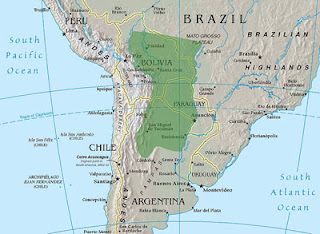 |
| Map of the Gran Chaco region |
The recent discovery of natural gas reserves in Bolivia put at risk the life of indigenous people and the unique environment of the Aguaragüe National Park and Integrated Management Natural Area (Parque Nacional y Área Natural de Manejo Integrado Serranía del Aguaragüe) in the Tarija Department .
The administration of the President Evo Morales has declared finding new natural gas fields a national priority. The elders and leaders in the indigenous community (Council of Captains) question the government´s approach in granting environmental permits for seismic exploration used to monitor the presence of natural gas in their territories. Communities are concerned about the dynamite explosions set up 15 metres underground, because the blasts shift the courses of underground water in an area where daily temperatures are above 30 degrees Celsius and other water sources are scarce. This seismic exploration also frightens off the local fauna as well as species that are sources of food for the indigenous peoples.
Of some 730,000 hectares that the government assigned to the oil companies, 317,218 are located in territories of Yaku-igua, Itika Guasu and Tentayapi Guaraní indigenous groups. Some 80,000 native peoples inhabit the region.
The oil companies operating in the area are: BG Bolivia Corporation (with British capital), the government´s Chaco SA, Petrobras, Argentina´s Pluspetrol, Repsol Bolivia (an affiliate of Spain´s Repsol), and Total Bolivie, of France´s Total Corporation.
The oil industry is Bolivia´s principal source of tax revenues, and in 2008 oil profits generated 1.46 billion dollars and there is no willingness in the government to turn its attention to alternative activities for the region, such as tourism and attracting resources for preserving Bolivia´s forests.
Tarija Department has reserves of 41.7 trillion cubic feet of natural gas, 80 percent of the country´s total. Most of this fuel is exported to Brazil and Argentina.
Tarija Department has reserves of 41.7 trillion cubic feet of natural gas, 80 percent of the country´s total. Most of this fuel is exported to Brazil and Argentina.
The state-run oil and gas firm Yacimientos Petroliferos Fiscales Bolivianos (YPFB) has decided last January the location for the Bolivia's Gran Chaco gas-to-liquids separation plant. The third biggest plant in South America which will be built in the Madrejones-Yacuiba area, in the southern Tarija department will be operational in 2014.
Indigenous people are worried about the increasing destruction of the Chaco region's natural heritage. The symptoms of this destruction include contamination of water sources, changes in climate and rainfall, deforestation and soil erosion. In 1926 the state-run oil company YPFB began drilling oil in the area, and when it ended operations in 1987, it left behind destroyed forests and oil wells that leak toxic liquids, which continue to affect the local flora and fauna.
Not just the exploration, but also the exploitation and commercial use will bring environmental damages.The construction of pipelines and roads will be necessary to connect the gas fields with hub likes ports or plants.
The lack of regulations for consulting indigenous communities in Bolivia on initiatives that affect their territories is at the heart of a dispute over a road to facilitate traffic from Brazil, which would run through an enormous tropical national park self-governed by indigenous communities.
 |
| Evo Morales President of Bolivia |
The government argues that exporters in Brazil, Argentina and Paraguay need the roads, to be able to cross this landlocked country of 1.09 million square km in west-central South America, to reach Pacific Ocean ports in Chile and Peru and ship their goods to China.
More Information:
Guarani oppose Evo Morales extractive policies
Morales Clashes with Native Protesters over Road through Tropical Park
Guaraní, Tapieté Peoples Fight Gas Exploration

Conventional or retail sales taxes are only charged to the end user of a good or service.
ReplyDeleteIssacqureshi Non-Executive Director